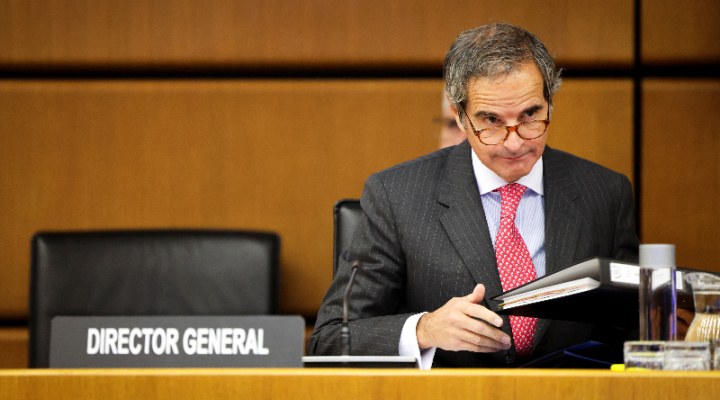International Atomic Energy Agency (IAEA) Director General Rafael Grossi arrives on the opening day of the agency’s quarterly Board of Governors meeting at the IAEA headquarters in Vienna, Austria, Nov. 20, 2024. Photo: REUTERS/Lisa Leutner
Iran will not grant access to its nuclear facilities during next week’s visit by a delegation from the UN’s nuclear watchdog, the International Atomic Energy Agency (IAEA), amid growing international pressure to reach a nuclear deal and avoid new sanctions, according to a top Iranian lawmaker.
On Monday, the head of the National Security and Foreign Policy Committee of Iran’s parliament, Ebrahim Azizi, confirmed that the visiting IAEA team will only be authorized to hold “technical and expert-level talks” with Iranian officials and experts.
“According to the laws passed by parliament, Iran will not let physical access to its nuclear facilities under any circumstances,” Azizi said in a press conference reported by Iranian state-run media.
“No inspector from the IAEA team or any other foreign organization will be allowed to be present at our country’s nuclear sites,” the Iranian lawmaker continued.
In June, the Iranian parliament voted to suspend cooperation with the IAEA “until the safety and security of [the country’s] nuclear activities can be guaranteed.”
At the time, Iranian Foreign Minister Abbas Araghchi attributed the decision to IAEA Director-General Rafael Grossi’s alleged bias against Tehran and a recent resolution accusing Iran of failing to cooperate with the UN nuclear watchdog over alleged “undeclared nuclear activities.”
“The IAEA and its Director-General are fully responsible for this sordid state of affairs,” Araghchi said in a post on X.
Grossi “directly facilitated the adoption of a politically-motivated resolution against Iran by the IAEA [Board of Governors] as well as the unlawful Israeli and US bombings of Iranian nuclear sites,” he continued.
During a press conference on Monday, Foreign Ministry spokesman Esmaeil Baghaei explained that next week’s visit by IAEA officials to Iran is intended to discuss the “method of interaction” with the agency.
“We are facing exceptional circumstances, as the facilities of a member of the Non-Proliferation Treaty [NPT] have been illegally attacked by two nuclear-armed regimes,” Baghaei said.
“Unfortunately, the IAEA did not remain impartial, failed to condemn the attacks, and instead issued a report that provided a kind of political ground for making excuses,” the Iranian diplomat continued.
In June, Israel and the US bombed Iranian nuclear sites in an effort to stop the regime from building nuclear weapons. Iran claims its nuclear program is for peaceful purposes.
The UN nuclear watchdog’s upcoming visit comes as Iran faces growing international pressure to resume negotiations on its nuclear program.
Last month, Tehran made its first attempt at direct talks with European powers since Israel, with the support of the US, launched an airstrike campaign targeting the country’s nuclear facilities and ballistic-missile capabilities.
The United Kingdom, France, and Germany — collectively known as the E3 — have previously warned they would reinstate UN sanctions on Tehran if no new agreement is reached by the end of August.
The sanctions were originally lifted under the 2015 nuclear deal — known as the Joint Comprehensive Plan of Action (JCPOA) — which imposed temporary restrictions on Iran’s nuclear program in exchange for large-scale sanctions relief.
Although the United States withdrew from the agreement in 2018 under President Donald Trump’s first administration, Iran and the three European nations have continued to uphold the deal.
Under the UN Security Council resolution implementing the nuclear accord, international sanctions could be reimposed on Iran through a “snapback” mechanism that would take about 30 days.
As for the United States, Iran has insisted that Washington must compensate Tehran for the losses incurred during the recent 12-day war with Israel to pave the way for renewed negotiations.
However, Araghchi made clear that a deal would remain off the table as long as Trump continued to demand that Iran commit to zero uranium enrichment.
Click this link for the original source of this article.
Author: Ailin Vilches Arguello
This content is courtesy of, and owned and copyrighted by, https://www.algemeiner.com and its author. This content is made available by use of the public RSS feed offered by the host site and is used for educational purposes only. If you are the author or represent the host site and would like this content removed now and in the future, please contact USSANews.com using the email address in the Contact page found in the website menu.





